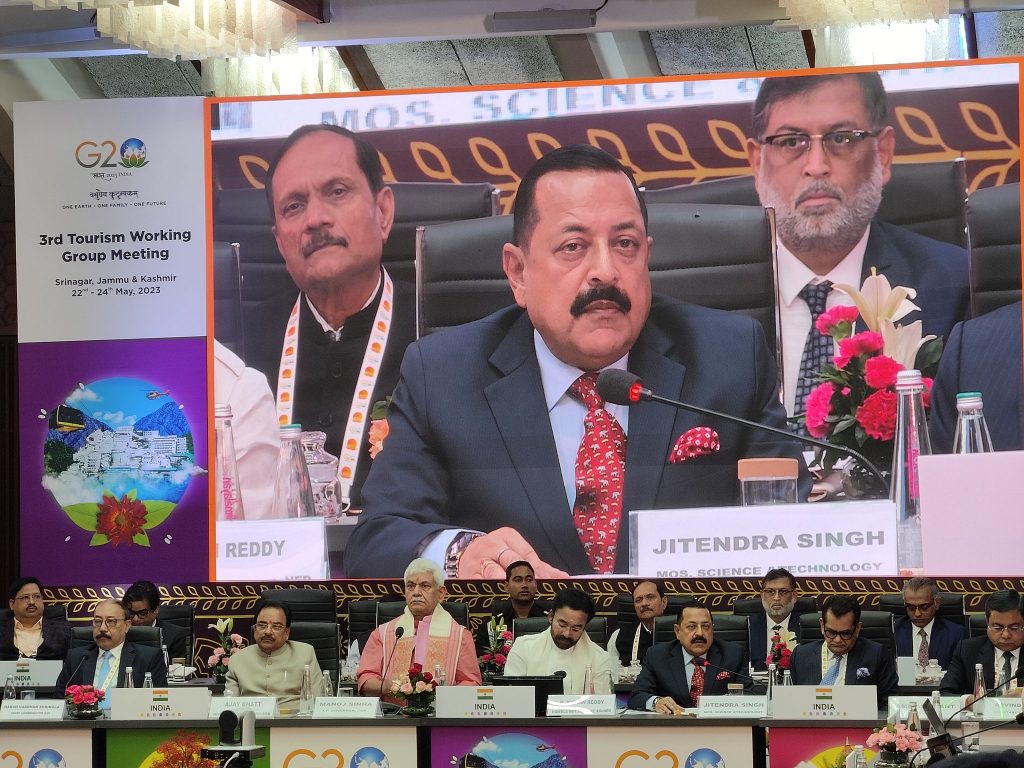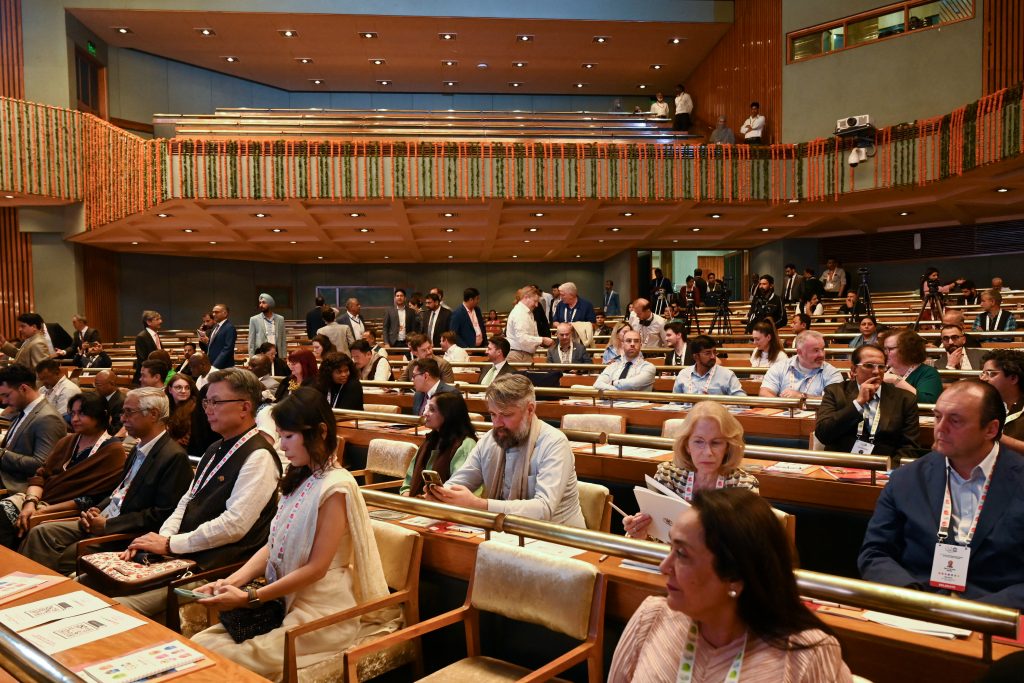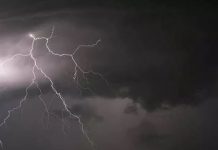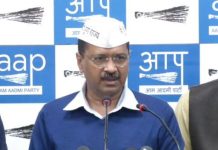
The 3-day G20 meeting held from May 22-24 is the most significant international event held in J&K since the revocation of Article 370 in 2019. The presence of 60 foreign delegates at the event is being seen as world’s implicit support for India on Kashmir, reports Riaz Wani
The three-day G20 tourism working group meeting from May 22-24 brought some fresh attention to Kashmir. After a long time, even foreign media was allowed to cover the region and they produced reports that were more nuanced in their description of the prevailing situation. Besides, the meeting drew a strong statement from China which cited the region’s “disputed” status as the reason for not attending it. Besides, four other countries – Turkey, Saudi Arabia, Egypt and Oman – didn’t participate. But they stopped short of issuing any statement.
The rest did attend, although with a scaled-down presence, among them the three Islamic countries – UAE, Indonesia and Bangladesh. This is being billed as a triumph of sorts for India’s stance on Kashmir. More so, as the countries are members of the Organization of Islamic Conference, a 57-country grouping which has a stand similiar to that of China on Kashmir.
Over the course of three days, the G20 delegates engaged in meetings and some sightseeing in a small area around the famous Dal Lake. Some far-off resorts such as Gulmarg which were earlier a part of their itinerary were dropped at the last minute, in view of the security issues.
At the end of it, both the union government and the local administration said they had every reason to be satisfied with the outcome. For one, the event passed without an incident despite the threats from the militant groups, a turn of events that was reflective of both the unprecedented security measures put in place by the government and the decline of militancy. High-security arrangements were made on the route to the airport and the delegates were taken in a cavalcade of vehicles to their accommodations along Dal Lake.

However, the shadow of the recent ambushes in Armoury and Pooch in Jammu division that between them killed ten security personnel loomed over the event as the security agencies feared that the militants might try to replicate the attack in the Valley. But the government was able to prevent it, a success that added to the perception of the normalcy in the region that the government was keen to convey to the outside world.
“The youth in Kashmir has moved on from the days when life used to come to a standstill and they no longer want to be identified with the past when Islamabad used to sabotage any important events by making a herbal call which would lead to shops in All Chow downing their shutters,’’ Union Minister of Science and Technology Dr Jitendra Singh said at a press conference during the event. “The mindset of people in J&K is changing. Strike calls are being issued from Pakistan and in Srinagar as well but the people don’t pay any heed now.”
He added that 61 delegates from 29 countries had taken part in the meetings in Kashmir and experienced the region’s natural beauty and normalcy first hand.
“The event will falsify all the false narratives created by vested interests or by cynics or self-styled critics. The event is a moment of rejuvenation and reincarnation. This is just returning to the Shammi Kapoor- era, who shot most films here. Kashmir is a cost-effective place with a variety of locations,” Singh said.
J&K lieutenant governor Manoj Sinha in a subsequent press conference which capped the event expressed optimism about the situation in the Valley. He said that J&K would soon rise as one of the world’s top 50 global tourism destinations while affirming the government’s commitment to promoting region as a diverse and inclusive destination.
“The way every section of the society enthusiastically participated in the G20 event is a sign of the rise of new and emerging Jammu and Kashmir,” Sinha said.
Political significance
The G20 meeting was one of the most significant international events held in J&K since the nullification of Article 370 in 2019. By hosting this event, the union government showed that most of the major world powers not only endorsed the move but also acknowledged the prevailing normalcy. The effort of both the central government and the LG administration is now to build on the gains in achieving peace and use it to bring more tourists to the region.
But it is also true that the significance of the event didn’t stem from its focus on tourism. On the contrary, the G20 meetings in the Valley acquired a geopolitical significance of their own. The general drift of the opinion in India is that the event was an endorsement of New Delhi’s revocation of Article 370 and, as such, represents a significant shift in the approach of major powers on Kashmir.
“By agreeing to hold the G20 event in Kashmir, the international community is sending a clear message of support for India’s actions (in the region),” read an editorial in a local daily. “This is a significant shift in global geopolitics, as traditionally, the major powers have been reluctant to take sides on Kashmir.”
This is seen as a significant psychological coup for New Delhi, cementing the notion that the post-2019 Kashmir is a fait accompli.
Since 1989, Kashmir has been a site of unmitigated unrest and violence which have claimed thousands of lives. But in August 2019, the central government took the unprecedented step of revoking Kashmir’s special status. Ever since, New Delhi has taken a series of measures to control the unrest in the Valley and restore peace. And in the past three and a half years, the situation, has to a large extent, been brought under control. Kashmir now gives the appearance of being a normal place, giving New Delhi confidence to hold an event of international significance in the union territory.
Mixed bag
However, the overall take away from the event was a mixed bag for New Delhi. Around 122 delegates, including 60 foreigners, visited Srinagar for the G20 meeting. This also included powerful western countries, and so the event is seen as an implicit support for India on Kashmir. But the scaled-down diplomatic presence of the countries and the boycott of five countries, including a surprise absentation of Saudi Arabia, has detracted from the event’s positive fallout for India.
There was some opposition to the event by some human rights organizations, including the UN’s Special Rapporteur on Minority Issues, who in a statement said that “The Government of India is seeking to normalize what some have described as a military occupation by instrumentalizing a G20 meeting and portray an international ‘seal of approval.”
“International human rights obligations and the UN Declaration of Human Rights should still be upheld by organizations such as the G20”, he added, concluding that “the situation in Jammu and Kashmir should be decried and condemned, not push under the rug and ignored with the holding of this meeting”.
India’s mission to United Nations slammed Special Rapporteur over his comments terming them “baseless and unwanted.”
Incidentally, the support for the G20 event in Kashmir comes a month before Prime Minister Narendra Modi will travel to the US for an official state visit from June 21 to 24, where he will be hosted by US President Joe Biden at the White House. This will be PM Modi’s first state visit to the US during his nine-year long reign as prime minister and is seen as a loud acknowledgment of India as a global geopolitical player and a recognition of the country’s growing diplomatic heft.











